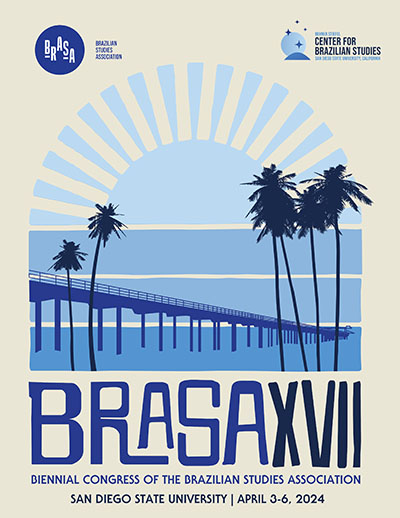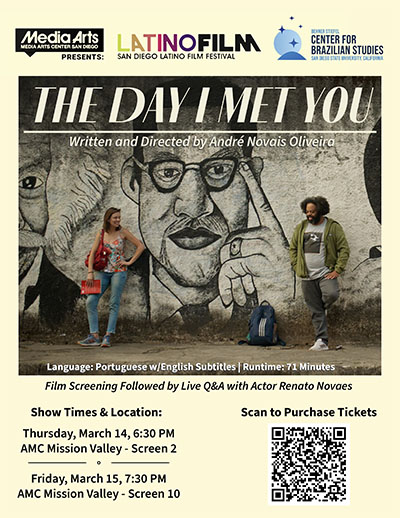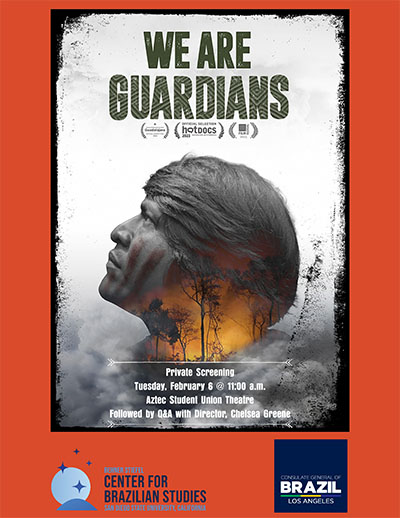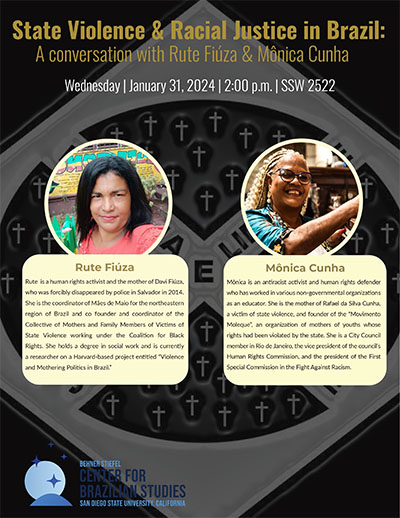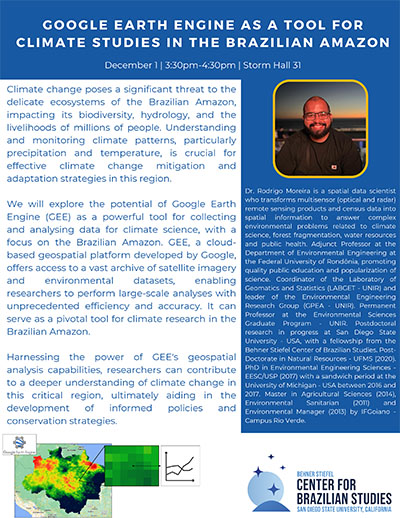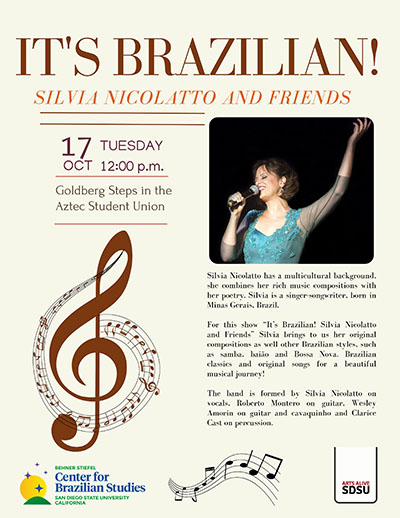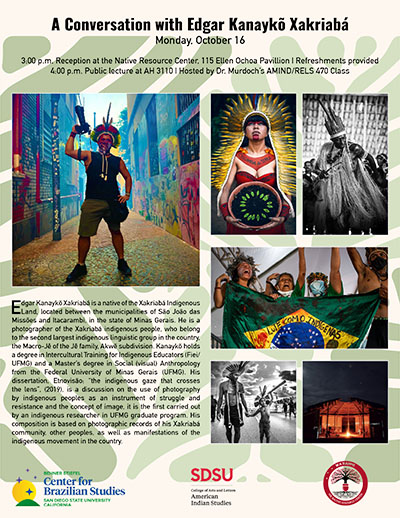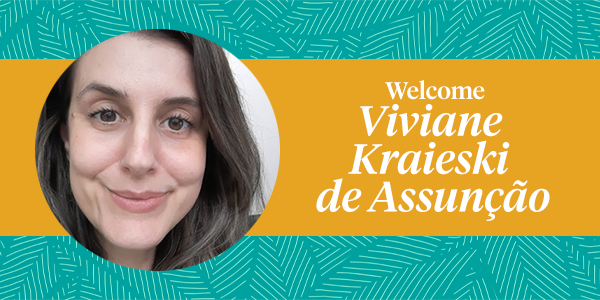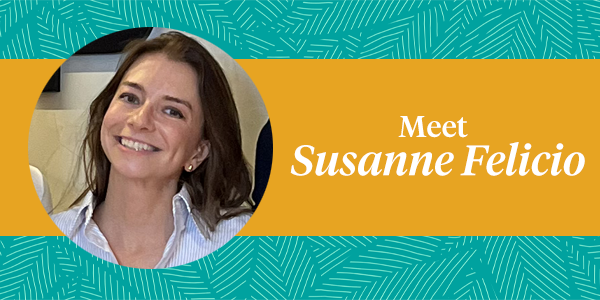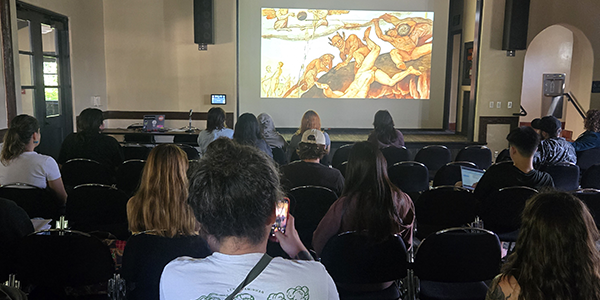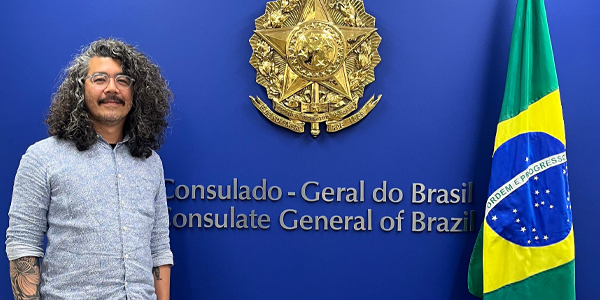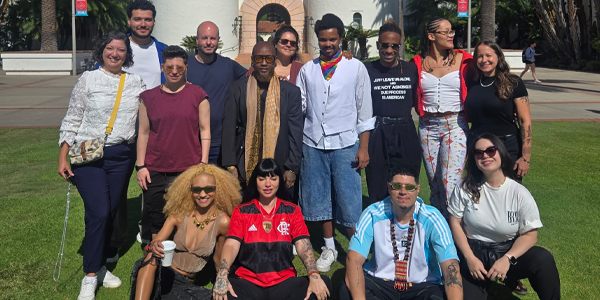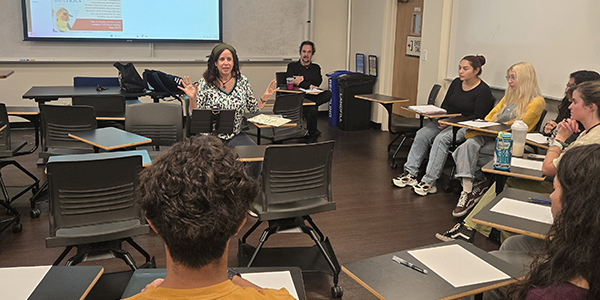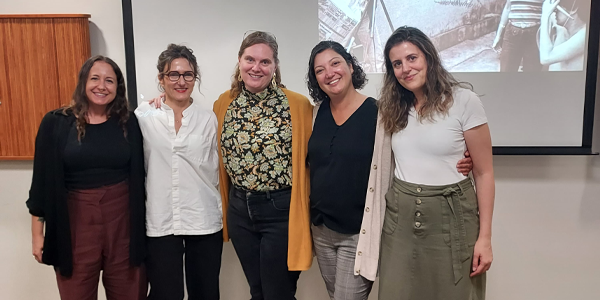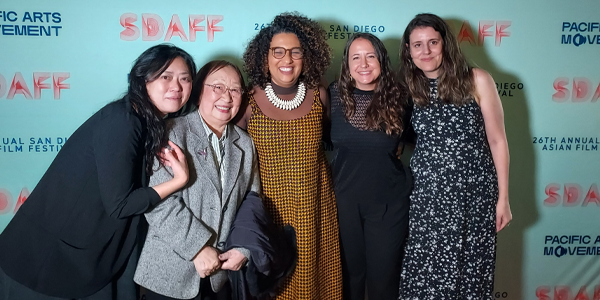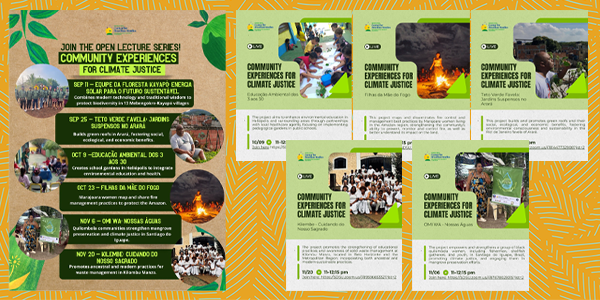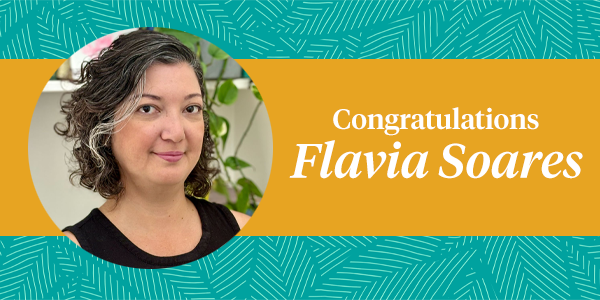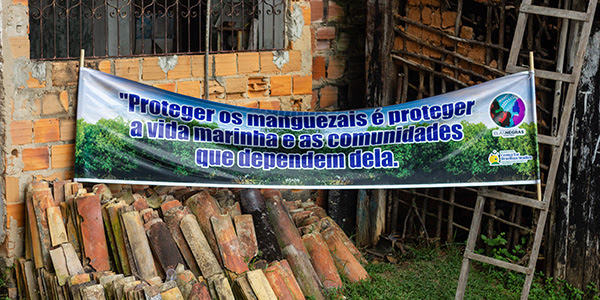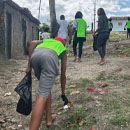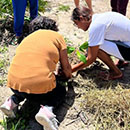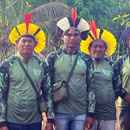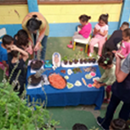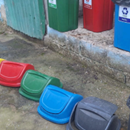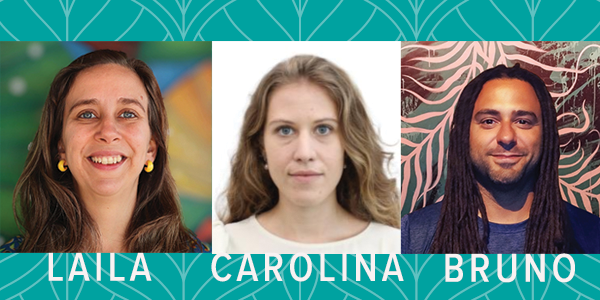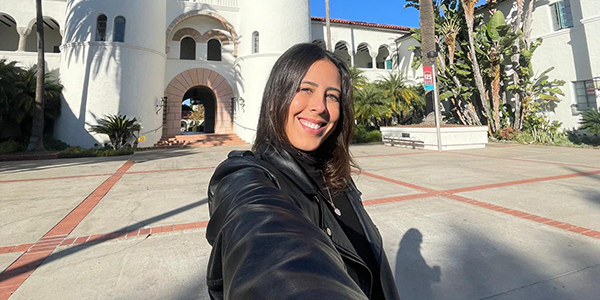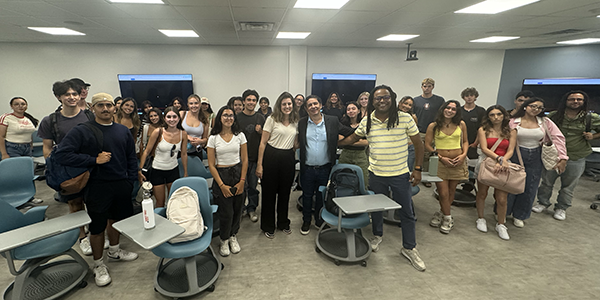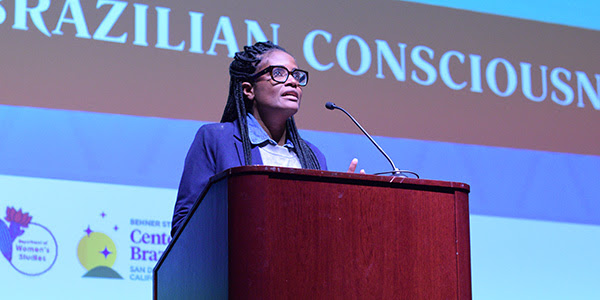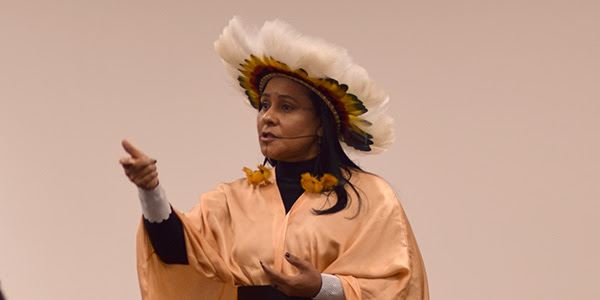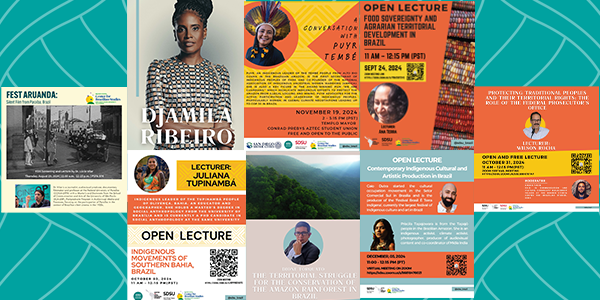Behner Stiefel Center for Brazilian Studies
Newsletter Fall 2025
Community Projects in Sustainability and Climate Change Awards
We are excited to share the recipients of the 2025-2026 Community Projects in Sustainability and Climate Change awards. This year, the Behner Stiefel Center for Brazilian Studies is supporting five new projects across Brazil that focus on environmental justice, climate adaptation, and empowering communities. These projects are led by Indigenous groups, grassroots organizations, and local associations, demonstrating the center’s commitment to working with communities for sustainability. Each project will receive support from August 2025 to July 2026.

Raízes Vivas – Cultivo e Cultura no Território Tupinambá (Tupinambá Indigenous Territory of Olivença - Bahia)
Raízes Vivas promotes the revitalization of ancestral land-management practices and the strengthening of food sovereignty across twenty-three communities. The project includes participatory mapping, technical workshops, environmental education in Indigenous schools, and a cultural fair highlighting agroecology and traditional knowledge. Through community communication strategies and youth engagement, Raízes Vivas supports cultural continuity and environmental stewardship.
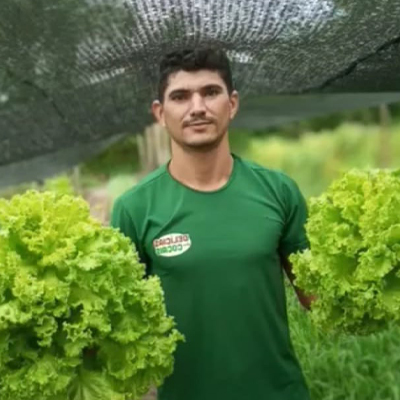
Mãos na Terra – Empreendedorismo Juvenil e Sustentabilidade no Campo (Cocais Territory - Piauí)
Located in the Cocais Territory, Mãos na Terra establishes a seedling nursery operated by families, rural youth, and local schools. The project focuses on native tree cultivation, food security, and youth entrepreneurship while offering technical training in agroecology and nursery management. In its second phase, community workshops, exchange visits, and cooperative expansion will broaden participation and strengthen local capacity for sustainable production.
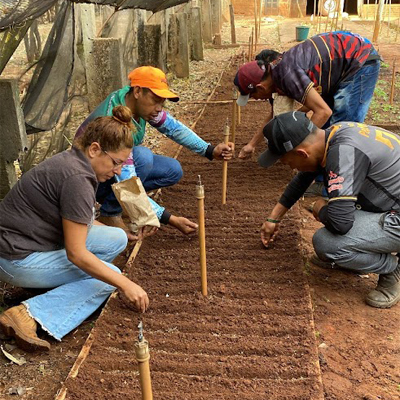
Kokuê Porã – Roça Bonita (Te’yikuê Indigenous Reserve, Mato Grosso do Sul)
Kokuê Porã supports Indigenous education at the Yvy Poty State High School by integrating agroecological training, craft practices, and community-based research. Students and teachers collaborate to establish family gardens, document traditional knowledge about yerba mate, and develop environmental education activities. The project also promotes youth-led audiovisual production and facilitates connections with regional universities through field visits and knowledge-exchange workshops.
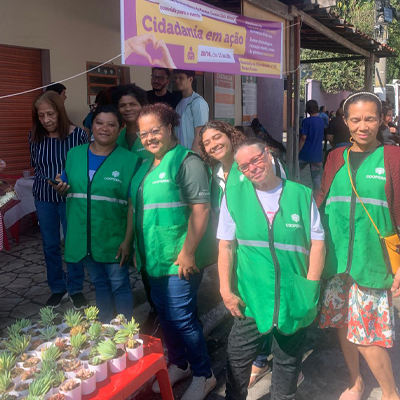
Amigos da Compostagem do Parque Cocaia (Grajaú - São Paulo)
This community-based initiative mobilizes residents of Parque Cocaia to adopt sustainable waste-management practices through composting, recycling education, and climate-justice awareness. Led primarily by adults over fifty, the project builds intergenerational knowledge by organizing school visits, training courses at recycling cooperatives, door-to-door organic collection routes, and community events. Compost produced through the project supports food cultivation and strengthens local environmental resilience in the Guarapiranga–Billings watershed region.
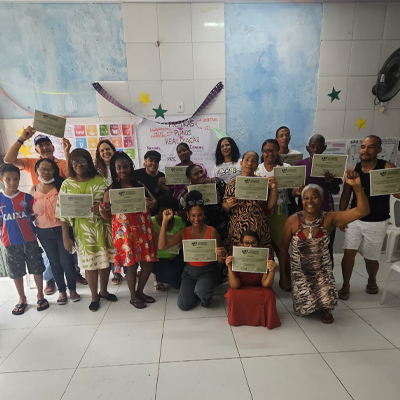
Capacitação Multirriscos para Lideranças Comunitárias (Salvador, Bahia)
Focused on climate adaptation in underserved neighborhoods, this project trains fifteen community leaders in risk mitigation, public policy analysis, and climate-action strategies. Through a series of thematic workshops, leaders co-create educational materials and develop awareness activities tailored to their communities. The initiative combines technical training with creative communication tools, including children’s booklets, social-media videos, and accessible materials aimed at promoting environmental awareness and collective action.
Welcome to the 2025-2026 Sustainability Fellow: Viviane Kraieski de Assunção
We are pleased to welcome back Viviane Kraieski de Assunção as our Sustainability Fellow for the 2025–2026 academic year. A visiting scholar at SDSU and professor in the environmental sciences graduate program at UNESC, Viviane holds a Ph.D. and M.A. in social anthropology from UFSC, with research experience at Columbia University and Vrije Universiteit Amsterdam. She leads the Environment, Culture and Society Research Group (GPMACS) and works on development projects, environmental impacts, food practices, and urban socio-spatial dynamics. This year, she is teaching BRAZ 333: The Amazon Is the Center of the World, contributing to CBS research initiatives, and advancing comparative research on the social effects of lithium extraction in Southern California. We are delighted to have her with us again.
Student Spotlight: Susanne Felicio
Economics and statistics major Susanne Felicio spent the summer completing a professional internship in São Paulo, Brazil, supported by the Behner Stiefel Center for Brazilian Studies. Encouraged by her Latin American economics professor, she applied to Elo Consultoria to gain hands-on experience that aligned with her academic training. At Elo Group, Felicio worked on a consulting project for a company in the agribusiness sector, where she collected and analyzed large datasets, interpreted market indicators, and helped align sales expectations with current conditions in the fertilizer market. Daily team meetings, technical discussions, and direct contact with company managers and directors gave her a grounded understanding of how economic analysis operates in real-time organizational settings. She emphasized that applying her SDSU coursework, including micro and macroeconomic analysis, was essential for navigating complex data and understanding how broader market forces shaped the company’s internal restructuring process.
Beyond her responsibilities at Elo Group, Felicio’s experience living in São Paulo was equally transformative. She adapted quickly to the city’s fast-paced environment, praising its extensive metro system, vibrant food scene, and constant cultural activity. She noted that Brazilian business culture places strong value on interpersonal relationships; shared lunches with colleagues strengthened collaboration and improved the flow of information essential to her work. Using public transportation during peak hours, learning workplace dynamics, and reconnecting with Brazil after many years in the United States helped her see the country from a new perspective — now through the eyes of an emerging economist. Felicio described the internship as a turning point in her academic journey, confirming her passion for economics and statistics and inspiring her to pursue a global career. She expressed deep gratitude to the Behner Stiefel Center for making this opportunity possible and encourages other SDSU students to consider international internships as powerful experiences that shape both professional growth and personal development.
Past Events
The SDSU Brazilian Film series: Film Screening of “La Flaca” and “Èṣù and the Universe”
On October 6, the Behner Stiefel Center for Brazilian Studies in collaboration with SDSU Department for the Study of Religion, hosted a special screening featuring two award-winning Brazilian films: “La Flaca” (2018) and “Èṣù and the Universe” (2022), directed by Thiago Zanato and Chica Barbosa. The event offered SDSU students and community an opportunity to engage with powerful cinematic works that explore spirituality, gender identity, ancestry, resistance, and the lived experiences of Afro-Latin American diasporas. Through innovative storytelling and striking visual language, both films weave together art and politics to illuminate complex social worlds.
The screening concluded with a Q&A with the filmmakers, fostering a meaningful exchange between Brazilian creators and the SDSU community. Their discussion provided insights into the creative process, the cultural significance of their films, and the broader role of cinema in shaping transnational dialogues. The event strengthened ongoing partnerships in Brazilian arts and highlighted the center’s commitment to supporting transformative storytelling across borders.
Work-in-Progress Screening: “Quando a Gente Vira Um”
The Behner Stiefel Center for Brazilian Studies, in collaboration with SESC São Paulo (Social Service of Commerce - São Paulo) and the Consulate General of Brazil in Los Angeles, hosted a special work-in-progress screening of “Quando a Gente Vira Um” on October 7 at the Brazilian Consulate in Los Angeles. Directed by Shinji Shiozaki and Cláudia Dias Perez, the 85-minute film traces the story of Mestre Ambrósio, a groundbreaking Brazilian group known for blending traditional cultural forms with musical innovation on national and international stages. Following the screening, the director Shinji Shiozaki engaged in an in-depth Q&A session, offering the audience a unique look into the creative process, archival research, and artistic vision behind the project. The event celebrated Brazilian music, cinema, and cultural heritage with audiences from across Southern California.
Skate, Art, and Border Dialogues in Tijuana
In partnership with the Hansen Peace Chair and the Brazilian collective Flanantes, the Behner Stiefel Center for Brazilian Studies supported a vibrant cultural program in Callejón Manos Sucias, Tijuana, on October 8. The event brought together skaters, artists, and community members for a screening of the skate video “Dial a Poem” and the documentary “Imaterial,” followed by a discussion led by directors Murilo Romão and Shinji Shiozaki. Through film, visual art, and collective dialogue, participants explored the intersections of skate culture, creative expression, and border narratives. The gathering also served as a lead-up to the bi-border exhibition Border Crossing and The Stoke Sessions 2.0 Conference in San Diego, expanding opportunities for cross-cultural exchange through art and movement.
Celebrating Brazilian Filmmakers at SDSU
The Behner Stiefel Center for Brazilian Studies, in partnership with the BRAVO Film Festival, the Consulate of Brazil in Los Angeles, and Spcine, hosted a special event highlighting the new generation of filmmakers shaping Brazilian cinema. A group of fellows supported by Spcine and BRAVO traveled to Los Angeles to participate in the festival and meet with Hollywood executives. On October 22 they visited campus for an event held in Assistant Professor Daniela Gomes’ class, where this outstanding group of directors presented their audiovisual work, discussed their creative processes, and reflected on the diversity and vitality of contemporary Brazilian audiovisual production.
This collaborative program offered students a unique opportunity to engage directly with leading voices in Brazil's film landscape and to explore the artistic, political, and cultural visions underpinning their work. Their visit showcased the richness and breadth of Brazilian cinema and reinforced the center’s commitment to supporting transnational dialogue in the arts.
Book Launch — “Stories and Lyrics: A Poetic Flight”
The CBS in collaboration with the Department of Spanish and Portuguese Languages and Literatures, hosted author Silvia Nicolatto for the launch of her trilingual book “Stories and Lyrics: A Poetic Flight.” Held on October 15, the lecture-performance invited participants to engage in an immersive experience of reading, listening, and collective reflection. Through poetry, music, and multilingual dialogue in English and Portuguese, Nicolatto guided the audience through her creative process and opened space for a discussion circle that connected her work with excerpts from the Luso-Brazilian literary tradition. The event brought together students, faculty, and community members for a vibrant celebration of contemporary Brazilian literature.
Error as Adventure — Lygia Pape’s Film Work
The School of Art and Design in collaboration with CBS welcomed Patrícia Mourão de Andrade for a special lecture on November 12 exploring the experimental film work of Brazilian artist Lygia Pape. A visiting scholar in film studies at the Graduate Center, City University of New York, Mourão guided the audience through Pape’s innovative cinematic universe, highlighting her use of improvisation, visual risk-taking, and creative freedom as core artistic strategies. Held in the Gold Auditorium at the Shiley Bioscience Center, the event offered students and community members a rare opportunity to engage with one of Brazil’s most visionary filmmakers through an interdisciplinary lens connecting art, film, and political expression.
CBS at the San Diego Asian Film Festival
The Behner Stiefel Center for Brazilian Studies was honored to support the San Diego Asian Film Festival by providing interpretation for the Q&A session following the screening of “Hibakusha – Wandering Soul,” a short film directed by Joel Yamaji. The film offers a powerful reflection on memory, peace, and resilience, weaving the memories and imagination of Takashi Yamaji, a survivor of the Hiroshima nuclear attack and immigration in Brazil. CBS faculty and students joined the festival’s filmmakers and audiences for an evening of dialogue that highlighted the importance of cross-cultural collaboration in independent cinema.
As part of SDSU’s commitment to global arts engagement, the center was proud to contribute to a festival that brings together diverse artistic voices and fosters meaningful connections across communities. The event underscored cinema’s ability to bridge histories and geographies, reinforcing CBS’s dedication to supporting transnational conversations through film and storytelling.
Screening of “Orí” and Conversation on Beatriz Nascimento’s Legacy
As part of Brazilian Black Consciousness Month, the Behner Stiefel Center for Brazilian Studies in collaboration with Africana Studies hosted a special screening of “Orí” (1988), Raquel Gerber’s landmark film exploring memory, identity, and the African diaspora through the life and thought of historian and activist Beatriz Nascimento. Organized by Daniela Gomes and held on November 19, the event brought together students, faculty, and community members for a great opportunity to engage on Nascimento’s intellectual and political contributions. The gathering marked an important celebration of Afro-Brazilian knowledge, resistance, and cultural heritage during Palmares V at SDSU.
Open Lecture Series: Community Experiences for Climate Justice
In fall 2025, the CBS supported an open lecture series organized by our Sustainability Fellow Viviane Kraieski de Assunção. The session expanded classroom learning through a public conversation on community-led environmental action across Brazil, highlighting grassroots responses to climate change, food sovereignty, and territorial protection in Amazonian and Afro-Brazilian regions.
Drawing from the CBS series “Community Experiences for Climate Justice,” the lecture introduced students in BRAZ 333: The Amazon is the Center of the World to ongoing projects led by Indigenous, quilombola, and favela-based organizations. These initiatives ranged from Marajoara women’s fire management practices in the Amazon to quilombola to educational programs on sustainable waste management in Kilombu Manzo. Through these case studies, students examined how environmental stewardship is shaped by ancestral knowledge, community governance, and local struggles for justice. The lecture opened an important space for dialogue at SDSU, connecting course themes with the lived experiences of Brazilian communities who place the environment at the center of political, cultural, and collective life.
Congratulations to Our CBS Administrative Coordinator, Flavia Soares
We are delighted to congratulate Flavia Soares, administrative coordinator of the Behner Stiefel Center for Brazilian Studies, on beginning the M.A. in Latin American Studies at San Diego State University this fall semester. Soares’s research interest is to examine how community-based organizations in Brazil develop creative environmental solutions and how access to public policies and resources can either empower or silence these efforts.
We are proud to celebrate this new chapter and look forward to the contributions she will continue to make to our center and to the broader field of Latin American Studies.
Past Newsletters
Outstanding Faculty Global Engagement Awards 2024
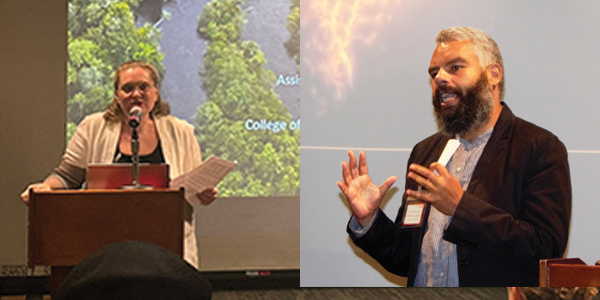 We are thrilled to announce that two of our affiliated faculty have been named recipients
of the 2024 Outstanding Faculty Global Engagement Award. Gillian Sneed, assistant professor in the School of Art and Design, has received the Outstanding
Global Research and Creative Activity Award for her exhibition “The Imaginary Amazon.”
This recognition celebrates her innovative and impactful work in visual arts, which
explores the intersections of cultural expression and environmental themes in the
Amazon.
We are thrilled to announce that two of our affiliated faculty have been named recipients
of the 2024 Outstanding Faculty Global Engagement Award. Gillian Sneed, assistant professor in the School of Art and Design, has received the Outstanding
Global Research and Creative Activity Award for her exhibition “The Imaginary Amazon.”
This recognition celebrates her innovative and impactful work in visual arts, which
explores the intersections of cultural expression and environmental themes in the
Amazon.
Additionally, Roberto Ivo Da Rocha Lima Filho, international visiting professor at the Behner Stiefel Center for Brazilian Studies, has been honored with the Outstanding International Scholar Award. Lima Filho's dedication to cross-border research and his expertise in economics, with an emphasis on energy economics, economic engineering, decision sciences, and behavioral economics, has made a lasting impact in his field and beyond.
Congratulations to both Gillian and Roberto! These prestigious awards recognize their significant contributions to global and transborder research, education, and service, advancing SDSU’s commitment to diversity, equity, inclusion, and sustainability.
Erika Robb Larkins receives honorary citizenship award from the city of Rio de Janeiro
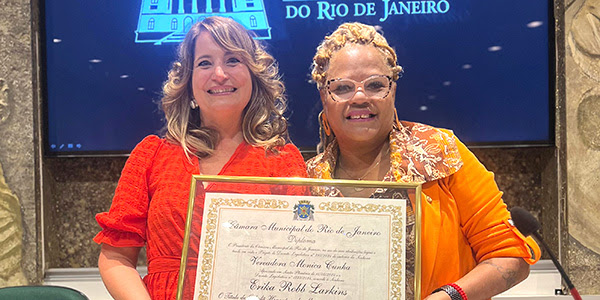 Erika Robb Larkins, professor of anthropology and co-director of the Behner Stiefel Chair of Brazilian
Studies has been awarded the prestigious title of Honorary Citizen of Rio de Janeiro
(Cidadã Carioca). The honor was conferred by Councilwoman Monica Cunha on behalf of
the City Council of Rio de Janeiro in a ceremony held on August 7, 2024.
Erika Robb Larkins, professor of anthropology and co-director of the Behner Stiefel Chair of Brazilian
Studies has been awarded the prestigious title of Honorary Citizen of Rio de Janeiro
(Cidadã Carioca). The honor was conferred by Councilwoman Monica Cunha on behalf of
the City Council of Rio de Janeiro in a ceremony held on August 7, 2024.
The Honorary Citizen title is one of the highest accolades the city can bestow, recognizing individuals who have made significant contributions to the cultural, social, and intellectual life of Rio de Janeiro. Larkins' work in the fields of anthropology and urban studies, particularly her research on violence, inequality, human rights, and racial justice in Brazil, has had a profound impact on understanding and addressing critical social issues in the city.
"I am deeply honored to receive the title of Honorary Citizen of Rio de Janeiro," Larkins said during the ceremony. "This city holds a special place in my heart, and my work here has been driven by a deep commitment to understanding the challenges faced by its residents and contributing to meaningful change. I am grateful to Councilwoman Monica Cunha and the City Council for this recognition and look forward to continuing my engagement with the people of Rio."
Larkins has been actively involved in various initiatives aimed at improving social conditions in Rio de Janeiro, working closely with local communities, activists, and policymakers. Her research has not only advanced academic knowledge but has also informed public policy and grassroots efforts to address issues of violence, inequality, and social justice in the city.
Brazilian Day Festival 2024
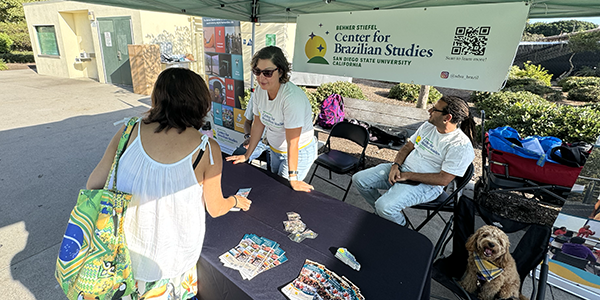 The Behner Stiefel Center for Brazilian Studies participated in the San Diego Brazilian
Day Festival on Sept. 14, held at Ruocco Park in downtown San Diego.
The Behner Stiefel Center for Brazilian Studies participated in the San Diego Brazilian
Day Festival on Sept. 14, held at Ruocco Park in downtown San Diego.
The Center hosted a booth where staff and students engaged with the local community, providing information about the Brazilian Studies undergraduate major and certificate programs at SDSU. They also highlighted the Center’s research and community projects in sustainability, human rights, education and culture.
The festival, organized by the non-profit Devoted to Youth, brought together people from across San Diego to celebrate Brazilian culture and community.
Community Projects
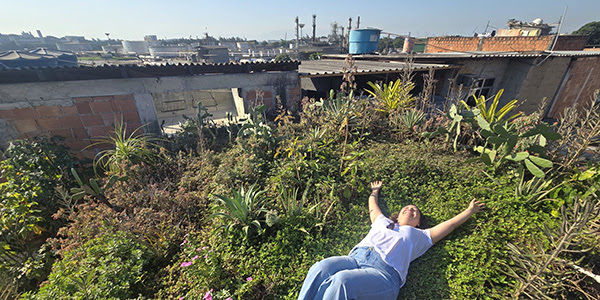 Sustainability Initiative: Community Project Visits in Brazil – Fostering Sustainable
Innovation and Environmental Education
Sustainability Initiative: Community Project Visits in Brazil – Fostering Sustainable
Innovation and Environmental Education
This summer, the Behner Stiefel Center for Brazilian Studies visited two extraordinary
community projects, both of which are funded by our sustainability initiative. Flavia Soares and Kristal Bivona traveled to Rio de Janeiro and São Paulo, respectively, where they connected with
community leaders and project teams working to address urban environmental challenges.
Teto Verde Favela: Jardins Suspensos no Arará (Rio de Janeiro/RJ - 2023)
In Rio de Janeiro, Flavia Soares visited the “Teto Verde Favela” project in the Arará favela, where she met with Luis Cassiano and Alessandra Castaneda to observe the outcomes of their work on the “Jardins Suspensos no Arará” initiative. This project, rooted in innovative green roof technology, introduces hydroponic systems that use resilient rupicolous and epiphytic plant species, requiring no traditional substrate. The main objectives? To decrease surface and internal temperatures, boost energy efficiency, enhance fire resistance, and reduce noise pollution — all while creating beautiful spaces for cultivating food and medicinal plants.
With support from the CBS, from June 2023 through February 2024, the “Teto Verde Favela” transformed community spaces by installing green roofs on public buildings like Praça Zélia Duarte Borges. Working closely with local environmentalists, this project revitalized the community
square, turning it into an outdoor cultural hub blending botanical displays with art,
known as TerritóRIO: Quintal do Arará. The initiative not only brought significant environmental benefits but also engaged
local residents in workshops to learn about sustainable technology and climate action.
The project has already delivered impressive outcomes: reduced temperatures, energy
savings, and strengthened community bonds. With plans to install additional green
roofs in public spaces and expand partnerships with NGOs, “Teto Verde Favela” is set to grow in 2024.
Educação Ambiental dos 3 aos 30 (Heliópolis, SP - 2024)
Meanwhile, in São Paulo, Kristal Bivona visited Educação Ambiental dos 3 aos 30 in Heliópolis, a project dedicated to empowering community members through environmental education for all ages. She met Samantha Orui and the project team to explore their progress in establishing pedagogical gardens across public schools in collaboration with local healthcare agents. Grounded in the principles of emancipatory education advocated by Paulo Freire, Educação Ambiental dos 3 aos 30 collaborates with Future Architecture Cities Lab at Insper to creatively address urban climate change adaptation in a way that resonates with the community’s needs.
Over a 12-month period, these gardens will serve as hands-on educational spaces, where
community members and students learn about urban agriculture, composting, and the
impact of green spaces on public health. These gardens play a critical role in mitigating
the urban heat island effect, combating heat waves, and promoting environmental health.
By fostering a practical understanding of ecological responsibility among children
and young adults, Educação Ambiental dos 3 aos 30 is shaping a generation equipped to tackle climate and environmental challenges in
their own neighborhoods.
These visits emphasize the transformative power of community-centered initiatives.
The Behner Stiefel Center for Brazilian Studies is proud to support and learn from
these outstanding examples of local environmental stewardship.
Community Projects in Sustainability and Climate Change Initiative Awards
We are thrilled to announce the winners of our Community Projects in Sustainability
and Climate Change initiative for 2024! This year, the Behner Stiefel Center for Brazilian
Studies is supporting a remarkable array of projects across Brazil, each committed
to advancing climate justice, environmental sustainability, and community empowerment.
These initiatives, led by Brazilian grassroots NGOs, social movements, and local associations,
embody the Center’s mission to foster collaborative solutions to pressing environmental
challenges. By combining local expertise with interdisciplinary approaches, these
projects not only build sustainable, climate-resilient communities but also create
a foundation for impactful knowledge-sharing on a national and global scale. We look
forward to supporting each project from March 2024 through February 2025, as they
make transformative strides in sustainability.
Omi Wa – Nossas Águas (Santiago do Iguape, Bahia)
Omi Wa – Nossas Águas empowers 15 Quilombola women from Santiago do Iguape, including fishers, shellfish
gatherers, and youth, by educating them on climate change and socio-environmental
rights. Through participatory activities, the project promotes mangrove preservation
and advocates for climate justice. In collaboration with local organizations, these
women gain essential skills to lead environmental management efforts within their
community, becoming champions of climate action.
Plantar Árvores e Produzir Alimentos (Mucajaí, Roraima)
In Mucajaí, Roraima, Plantar Árvores e Produzir Alimentos focuses on forest restoration by transplanting native and non-native seedlings. This
project supports settlers from the "Comunidade dos Sonho" and promotes agroecological
food production to enhance both community diets and economic opportunities. By working
alongside public institutions, the project is building a sustainable model to impact
both local ecosystems and community health.
Equipe da Floresta Kayapó: Energia solar para o futuro sustentável (Xingu River, Amazon Forest)
Along the Xingu River, the Equipe da Floresta Kayapó integrates solar energy technology with traditional knowledge in 13 Mebengokre-Kayapo
villages. This project enhances biodiversity monitoring, supports territorial protection,
and improves work conditions through sustainable energy sources. Partnering with the
Behner Stiefel Center and the Digital Brazil Project, this initiative empowers Kayapo
youth and elders to advocate for climate justice, serving as a model for indigenous
communities nationwide.
Educação Ambiental dos 3 aos 30 (Heliópolis)
The Educação Ambiental dos 3 aos 30 project brings environmental education to life through partnerships with local health
agents and public schools in Heliópolis. Over 12 months, this program uses pedagogical
gardens to engage students and families in sustainable practices, from agriculture
to composting. Drawing on Paulo Freire’s philosophy of emancipatory education, this
project, developed in collaboration with the Future Architecture Cities Lab at Insper,
aims to address urban climate adaptation and reduce heat islands.
Kilembe: Cuidando do nosso Sagrado (Belo Horizonte)
Kilembe: Cuidando do nosso Sagrado (Belo Horizonte) aims to strengthen educational practices and raise awareness about solid waste management
in Kilombu Manzo. Through a structured four-stage plan, the project focuses on identifying,
reducing, reusing, and recycling community waste by integrating ancestral and modern
sustainable practices. Additionally, it emphasizes the importance of preserving local
forests to mitigate climate change effects, fostering a culture of environmental stewardship
within the community.
Welcome to the 2024-2025 Sustainability Fellows
We’re delighted to welcome our Sustainability Fellows for the 2024-2025 academic year,
each bringing their unique expertise to advance impactful teaching and research on
climate and environmental issues!
Laila Thomaz Sandroni
Our fall 2024 Sustainability Fellow, Laila is an environmental social scientist working
at the dynamic intersection of science and policy on global environmental issues,
particularly climate change and biodiversity. Known for her dedication to integrating
diverse knowledge systems, Sandroni seeks innovative, cross-disciplinary solutions
to today’s pressing sustainability challenges. Her impressive experience includes
collaborations with a range of stakeholders — from Indigenous organizations and local
associations to federal agencies and NGOs — on projects focused on inclusive biodiversity
conservation in Brazil’s Atlantic Forest.
Carolina Stange Moulin
Our spring 2025 Sustainability Fellow, holds a dual Ph.D. in social sciences from
Osnabrück University, Germany, and in law from the University of São Paulo, Brazil.
With five years of research experience, she specializes in deforestation prevention,
socio-environmental policy, and supply chain governance, focusing on the Amazon biome.
Moulin’s work spans socio biodiversity value chains, environmental restoration, water
policy, and climate change adaptation. A former special advisor at the Secretariat
of the Environment and Sustainable Development in Goiás, Brazil, she has also conducted
research at the University of Luxembourg. Her expertise in environmental governance
and multi-scalar cooperation brings invaluable insights to our program.
Bruno Tarin Nascimento
Bruno will be our Community Engagement Sustainability Fellow for the spring semester
2025. Bruno brings a rich background in media studies, socio-environmental marketing,
and digital culture. His expertise spans the political economy of culture, socio-environmental
project management, and digital arts. With hands-on experience in multimedia production
and an emphasis on video arts, Bruno’s research explores the intersections of media,
society, and environmental responsibility.
We thank Sandroni for her incredible contributions this semester and look forward to seeing the impactful work Moulin and Nascimento will achieve during their fellowships!
Student Spotlight: Thairis Canhete
Thairis Canhete is a business administration major in Fowler College. Hailing from Santos, São Paulo, Brazil, she fulfilled her dream of studying at SDSU after she took a six-month intensive English course during a career transition. Living in San Diego has given Canhete a fresh perspective on education and culture. She appreciates the horizontal teaching style at SDSU, which fosters debate and critical thinking, and she values the cultural emphasis on objectivity in problem-solving.
Despite missing her family, friends, Brazilian cuisine, and the beach, she stays connected to her roots by maintaining simple traditions like eating rice and beans. Her favorite aspects of California include the vibrant beaches, outdoor activities, and seasonal adventures like surfing and snowboarding. Canhete encourages fellow Brazilian students to embrace studying abroad, describing it as a life-changing experience filled with opportunities for personal and professional growth.
Past Events
Fest Aruanda: Silent Film from Paraíba, Brazil
The Behner Stiefel Center for Brazilian Studies hosted a lecture by Brazilian visual scholar Lúcio Vilar and a screening of silent films from Paraíba, Brazil.
Held on August 29, this event was part of the LATAM 420: Latin America Through Film course, taught by visiting scholar Viviane Kraieski de Assunção, and introduced students and attendees to the world of early Brazilian cinema and the significant role that the state of Paraíba played in the 1920s silent film era.
Vilar, a professor, journalist and documentary filmmaker from the Federal University
of Paraíba (CCHLA-UFPB), is a specialist in audiovisual media with a focus on Paraíba’s
cinematic history.
IV Annual Celebrating Palmares Black Brazilian Consciousness Month Presents: Where We Stand: Empowering Voices through Speaking Place
The Behner Stiefel Center for Brazilian Studies and the Department of Africana Studies hosted Djamila Ribeiro, a renowned Brazilian philosopher, writer, and activist, for a talk and book launch event. Ribeiro, a prominent advocate for social justice and feminist movements in Brazil, introduced her latest book, “Where We Stand,” to a packed auditorium.
Held on November 14, this event was part of SDSU's 4th Annual Celebrating Palmares
Black Brazilian Consciousness month, providing a platform for Ribeiro to discuss her
work on Plural Feminisms, a movement she leads that includes an online platform and
a publishing label dedicated to amplifying marginalized voices in feminist discourse.
Attendees had the opportunity to engage with Ribeiro’s philosophies on identity, empowerment,
and social change, and the evening concluded with a book signing, connecting students,
faculty, and community members with her transformative ideas.
A Conversation with Puyr Tembé
The Behner Stiefel Center for Brazilian Studies, American Indian Studies Department, Anthropology Department and the San Diego International Sister Cities Association hosted a conversation with Puyr Tembé, an Indigenous leader from the Brazilian Amazon, on November 19, at SDSU's Conrad Prebys Aztec Student Union.
Puyr Tembé, the first secretariat of Indigenous peoples of Pará and co-founder of the National Association of Indigenous Ancestral Women Warriors (ANMIGA), shared insights on Indigenous advocacy and environmental protection. This event was free and open to the public, highlighting Tembé's role in the film “We Are Guardians” and her efforts to amplify Indigenous voices in global climate discussions leading up to the 2025 UN Climate Change Conference (UNFCCC COP 30) in Brazil.
Puyr lives and works in the Amazonian city of Belém, known as the “Gateway to the
Amazon.” She fights for the defense of Indigenous people in Brazil and has dedicated
her life to encouraging Indigenous involvement at the city, state, and federal level
throughout Brazil and the world.
Behner Stiefel Center for Brazilian Studies hosts open lecture series on environmental justice in Brazil
The CBS launched a series of open lectures entitled “Indigenous Peoples and Local Communities in Brazil: Transcultural Dialogues for Environmental Justice.” This initiative, led by Bruno Tarin and co-organized by Laila Sandroni, facilitated conversations about the intersection of Indigenous rights, environmental preservation and transcultural collaboration. The series highlighted the critical role that Indigenous Peoples and Local Communities (IPLCs) play in safeguarding ecosystems.
This platform for U.S.-Brazilian dialogue allowed SDSU's academic community to explore the perspectives of IPLCs, expanding beyond traditional environmental discourse. Each lecture featured a prominent community leader or policymaker in Brazil, including speakers from the Landless Workers' Movement, Indigenous movements, and advocates for the protection of Amazonian territories.
The series was part of the GEO 348: Environment and Development course, taught by Sandroni, and was open to all SDSU students, faculty and staff. The series ran throughout the fall semester covering topics such as food sovereignty, territorial rights and indigenous artistic production.
Recordings of all the lectures will soon be available on the Digital Brazil Project platform.
BRASA XVII hosted at San Diego State University
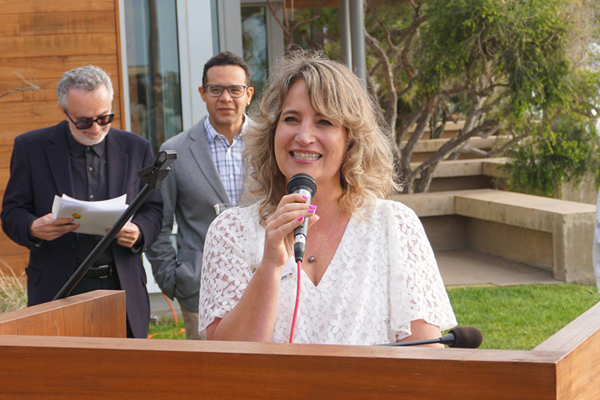 We’re excited to focus on BRASA XVII! BRASA (Brazilian Studies Association) is an
esteemed academic organization dedicated to the development and promotion of Brazilian
Studies, particularly within the humanities and social sciences. This year, we had
the immense honor of hosting the BRASA XVII right here on the campus of San Diego
State University from April 3-6, 2024.
We’re excited to focus on BRASA XVII! BRASA (Brazilian Studies Association) is an
esteemed academic organization dedicated to the development and promotion of Brazilian
Studies, particularly within the humanities and social sciences. This year, we had
the immense honor of hosting the BRASA XVII right here on the campus of San Diego
State University from April 3-6, 2024.
Held at the Conrad Prebys Aztec Student Union, the event was a success, drawing more than 600 attendees from Brazil and the United States. Over four days, the conference featured 160 panels covering a vast range of topics within Brazilian studies. The intellectual energy and enthusiasm created a vibrant atmosphere for scholarly exchange and networking.
We are immensely grateful for the participation of so many distinguished scholars and professionals, whose contributions helped make this event a landmark occasion. BRASA XVII not only showcased the richness and diversity of Brazilian culture and academic research but also reinforced the importance of international collaboration in the humanities and social sciences.
Thank you to everyone who attended and contributed to making BRASA XVII a truly unforgettable event. We look forward to seeing you all in BRASA XVIII at Bahia, Brazil.
We are also thrilled to announce that our Director, Erika Robb Larkins, has been elected BRASA president (2024-2026).
Center Launches New Community Researcher Residency
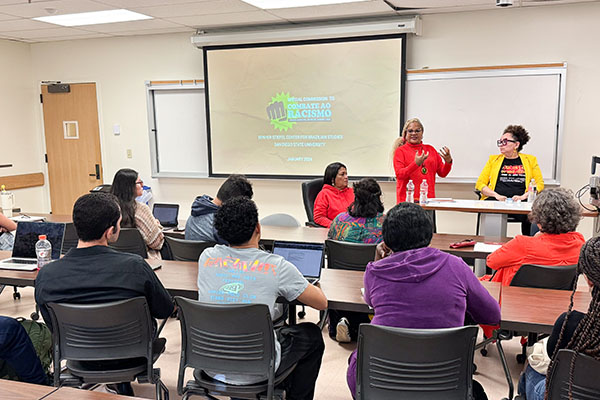 The center launched a new community researcher residency in partnership with the Antiracist
Caucus of Rio de Janeiro and City Council member Monica Cunha. Cunha is a Black woman, mother, antiracist activist and human rights defender who
has worked in various non- governmental organizations (NGOs) as an educator, and coordinator
of social projects. She is the mother of Rafael da Silva Cunha, a victim of state
violence and founder of the "Movimento Moleque," an organization of mothers of youths whose rights had been violated by the state.
Cunha was also the coordinator of the Network of Communities and Movements against
Violence and in 2019, she coordinated the Human Rights Commission of Alerj. She was
elected as an alternate for PSOL in 2020 and in 2023 took office as a councilor. She
proposed the installation and is the president of the first Special Commission to
Combat Racism in a legislative house in Brazil. Since then, she has focused her work
on promoting an anti-racist society. She is also vice-president of the Human Rights
Commission.
The center launched a new community researcher residency in partnership with the Antiracist
Caucus of Rio de Janeiro and City Council member Monica Cunha. Cunha is a Black woman, mother, antiracist activist and human rights defender who
has worked in various non- governmental organizations (NGOs) as an educator, and coordinator
of social projects. She is the mother of Rafael da Silva Cunha, a victim of state
violence and founder of the "Movimento Moleque," an organization of mothers of youths whose rights had been violated by the state.
Cunha was also the coordinator of the Network of Communities and Movements against
Violence and in 2019, she coordinated the Human Rights Commission of Alerj. She was
elected as an alternate for PSOL in 2020 and in 2023 took office as a councilor. She
proposed the installation and is the president of the first Special Commission to
Combat Racism in a legislative house in Brazil. Since then, she has focused her work
on promoting an anti-racist society. She is also vice-president of the Human Rights
Commission.
In January Cunha traveled to San Diego State University along with the inaugural community research in residence, Rute Fiúza. Fiúza is a human rights activist and the mother of Davi Fiúza, who forcibly disappeared by police in Salvador in 2014. She is the coordinator of Mães de Maio for the northeastern region of Brazil and co-founder and coordinator of the Collective of Mothers and Family Members of Victims of State Violence working under the Coalition for Black Rights. She holds a degree in social work and is currently a researcher on a Harvard-based project entitled “Violence and Mothering Politics in Brazil.”
Cunha and Fiúza delivered lectures at the event, “State Violence and Racial Justice in Brazil,” where they talked to students about police brutality and the anti-racist movement in Brazil, both on the ground via social movements such as the Black Coalition for Rights, the Mães de Maio and Movimento Moleque, and on the political front via initiatives like Cunha’s Special Commission to Combat Racism and the Human Rights Commission where she serves as vice-president.
Fiúza stayed in California for three weeks, during which she visited several classes at SDSU to deliver guest lectures and traveled to give talks at UCLA and Pitzer College. The center will receive one community researcher each year for the residency.
San Diego Latino Film Festival Welcomes Renato Novaes
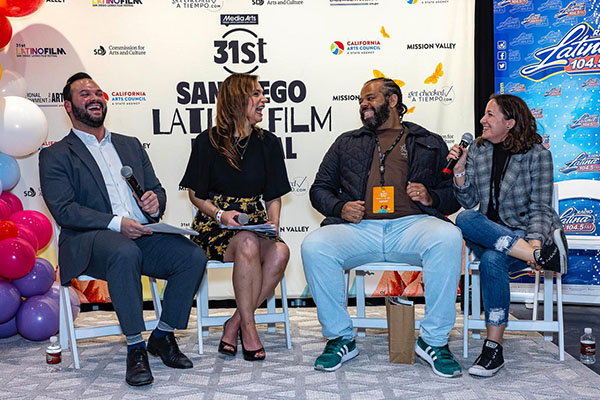 The Behner Stiefel Center for Brazilian Studies collaborated with the San Diego Latino
Film Festival (SDLFF)for the third year in a row to increase the presence of Brazilian
cinema at the festival. This year the Center hosted actor and filmmaker, Renato Novaes,
star of "The Day I Met You," which was selected as the opening film of the festival.
The Behner Stiefel Center for Brazilian Studies collaborated with the San Diego Latino
Film Festival (SDLFF)for the third year in a row to increase the presence of Brazilian
cinema at the festival. This year the Center hosted actor and filmmaker, Renato Novaes,
star of "The Day I Met You," which was selected as the opening film of the festival.
While in San Diego, Renato visited SDSU and delivered a guest lecture in BRAZ 325: Democracy in Brazilian Society. Students received free tickets to the festival to see "The Day I Met You" and had the chance to ask Renato questions about how he became an actor and his career in cinema.
In addition to participating in Q&As at the two screenings of the film at the festival. Renato also participated in the SDLFF’s press conference to promote the film.
Faculty Spotlight: Eliane Gomes Alves, Spring Semester Sustainability Fellow
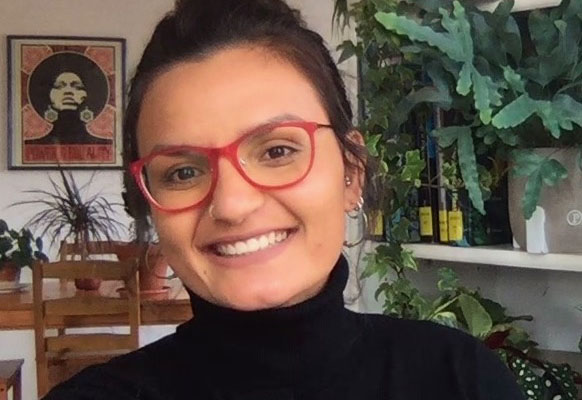 We are pleased to highlight our spring Sustainability Visiting Fellow, Eliane Gomes Alves. Gomes Alves is currently a researcher at the Max Planck Institute for Biogeochemistry
(MPI-BGC) in Germany and a collaborator in the graduate program in climate and environment
at the National Institute for Amazonian Research (INPA) in Brazil. She obtained her
Ph.D. in climate and environment at INPA in 2016, and her entire research career has
been developed in forest-atmosphere interaction research in the Amazon. She is interested
in investigating how plants (mainly trees) respond to the climate in primary forests
in central Amazonia and disturbed forests in the "Amazon Arc of Deforestation," where
environmental extremes such as heat and drought are becoming more frequent.
We are pleased to highlight our spring Sustainability Visiting Fellow, Eliane Gomes Alves. Gomes Alves is currently a researcher at the Max Planck Institute for Biogeochemistry
(MPI-BGC) in Germany and a collaborator in the graduate program in climate and environment
at the National Institute for Amazonian Research (INPA) in Brazil. She obtained her
Ph.D. in climate and environment at INPA in 2016, and her entire research career has
been developed in forest-atmosphere interaction research in the Amazon. She is interested
in investigating how plants (mainly trees) respond to the climate in primary forests
in central Amazonia and disturbed forests in the "Amazon Arc of Deforestation," where
environmental extremes such as heat and drought are becoming more frequent.
Gomes Alves has been part of several international project collaborations to carry out research in the Amazon. In addition to her scientific research, she devotes time to developing activities that impact teaching, mentoring, diversity and inclusion. Moreover, she is co-founder of the Latin America Early Career Earth System Scientist Network (LAECESS), a network to empower Latin Americans in the international scientific community.
SDSU Sends Two Fulbright Scholars to Brazil
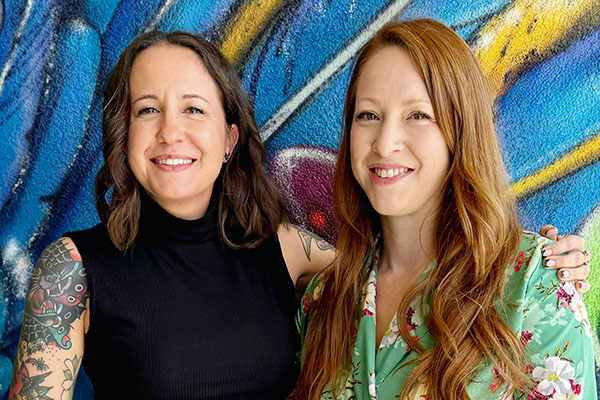 We are thrilled to announce that San Diego State University will be sending not one,
but two Fulbright scholars to Brazil in the 2024-2025 academic year. The Fulbright
Program is the flagship international exchange program sponsored by the U.S. government
to foster mutual cultural understanding. Kristal Bivona, associate director, Behner Stiefel Center for Brazilian Studies, will go to Brazil
as a Fulbright U.S. Scholar in fall 2024 and Ph.D. student, Lily Astete Vasquez will go to Brazil through the Fulbright U.S. Students Program in spring 2025. Both
Bivona and Astete Vasquez will be hosted by the Universidade Federal de Minas Gerais,
where they have forged previous research collaborations during their time in Belo
Horizonte through the NSF-funded project, “U.S. Brazil Collaboration to Expand Perspectives
on Water and Sustainability.”
We are thrilled to announce that San Diego State University will be sending not one,
but two Fulbright scholars to Brazil in the 2024-2025 academic year. The Fulbright
Program is the flagship international exchange program sponsored by the U.S. government
to foster mutual cultural understanding. Kristal Bivona, associate director, Behner Stiefel Center for Brazilian Studies, will go to Brazil
as a Fulbright U.S. Scholar in fall 2024 and Ph.D. student, Lily Astete Vasquez will go to Brazil through the Fulbright U.S. Students Program in spring 2025. Both
Bivona and Astete Vasquez will be hosted by the Universidade Federal de Minas Gerais,
where they have forged previous research collaborations during their time in Belo
Horizonte through the NSF-funded project, “U.S. Brazil Collaboration to Expand Perspectives
on Water and Sustainability.”
Bivona will be conducting field research for her book project on Brazilian cinema and democracy. In addition to studying the Minas-based film production company, Filmes de Plástico, she will also attend four of the country’s most important film festivals (in Brasília, São Paulo, Rio de Janeiro and Gramado) to write about the crucial role they play in supporting the film industry in Brazil and promoting Brazilian cinema abroad. Her research examines the relationship between democracy and cinema, examining both how the government impacts the content of film or censorship of audiovisual production, as well as the role of the government in encouraging or suppressing cinema and the audiovisual industry.
Astete Vasquez’s project is focused on the fundamental processes occurring within onsite sanitation systems (pit latrines, septic tanks, etc.) for determining ways to sustainably improve them. She has explored the development of a mobile waterless flushing toilet for providing people experiencing homelessness with low-maintenance sanitation options, and she’s in the process of patenting a technology to reduce the filling of solids in septic tanks. Her work applies to homeless encampments, disaster relief zones, refugee camps, and individual households in rural and developing global regions.
Student Spotlight: Victoria Argimon
We’d like to introduce you to Victoria Argimon, an undergraduate sociology major and a student assistant here at the Behner Stiefel Center for Brazilian Studies. When asked about her experience working with the center, Argimon responded, “It’s been amazing! I’m so lucky to have been able to meet and work with everyone here. I feel like I’ve learned so much from everyone.”
Argimon was born in Canada, but moved to Porto Alegre with her family as a child. At six years old, they moved to California where she’s lived ever since. Her experiences living in Brazil and having a Brazilian family left her deeply interested in Brazilian culture and political dynamics. Argimon plans to return to Brazil for a few years after finishing graduate school to work and spend time with her family.
When asked about her decision to study sociology and pursue higher education, Argimon explained that she has a deep passion for social justice, especially for the LGBTQ+ community. Studying sociology was a mechanism in which to get a more thorough understanding of why queer people are marginalized economically and socially. Additionally, Argimon is deeply interested in inequality, political economy, and labor history.
In her free time, Argimon likes to play bass in her band, read science fiction, spend time with her family, and practice her Portuguese.
Congratulations on graduating! We’re so happy to have had you with us.
Past Events
